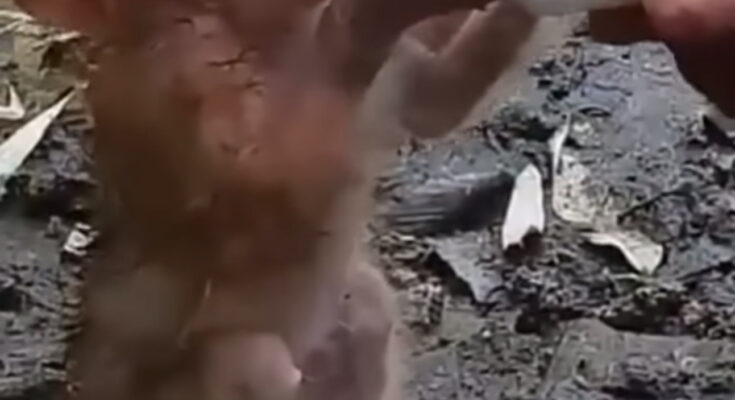Saving a Baby Monkey After Days of Starvation: A Life Restored With a Bottle of Milk
In a heartwarming display of compassion and resilience, a baby monkey on the brink of death was given a second chance at life—all thanks to a simple bottle of milk and the kindness of strangers.
The incident unfolded on the outskirts of a forest reserve where local villagers spotted a frail and motionless baby monkey lying near a roadside ditch. Alone, dehydrated, and visibly malnourished, the tiny creature had clearly been separated from its mother and troop. Days without food or water had left it in a critical state. Its ribs protruded, eyes half-closed, and body limp—a heartbreaking image of suffering.
Moved by the monkey’s condition, a local animal rescue volunteer, Ramesh Kumar, was immediately contacted. With years of experience in wildlife care, Ramesh recognized the urgency of the situation. “He was barely breathing. We had to act fast,” he later recounted.
The first step was hydration, followed by the careful administration of warm milk—one spoonful at a time. The milk, rich in essential nutrients and easier to digest for a weakened body, became the lifeline the baby monkey desperately needed. Within hours, signs of life began to return. Its eyes flickered open, its breathing steadied, and it even attempted to cling weakly to the arm of its rescuer—a faint echo of the instincts still alive within it.
Over the next few days, the baby monkey, lovingly named “Motu” by the rescue team, was kept under round-the-clock observation. Fed a specially prepared milk formula and gradually introduced to soft fruits, Motlu regained strength with each passing day. The transformation was remarkable: from a near-lifeless figure to a playful, energetic infant clinging to his caregiver’s shoulder.
But saving a baby monkey is more than just a medical endeavor—it’s an emotional journey. “He responded to our voices, snuggled during feeding times, and even began chattering softly. It was as if he knew he was safe,” said Maya Singh, a volunteer who played a key role in his recovery.
As Motlu healed, plans for his rehabilitation were set in motion. Wildlife experts aimed to slowly reintroduce him into a controlled natural environment, possibly alongside other orphaned monkeys in a sanctuary setting. Full release into the wild would depend on his ability to survive independently, a process that requires both time and training.
This story is not just about saving one monkey—it’s a powerful reminder of the impact small acts of kindness can have on vulnerable lives. In regions where human-animal conflict is rising due to habitat loss, stories like Motlu’s stand as a beacon of hope and coexistence.
For anyone who stumbles upon a similar situation, experts advise caution: avoid feeding wild animals inappropriate food and always contact local animal rescue organizations. A quick response can mean the difference between life and death.
Motlu’s story, which started in pain and abandonment, is now one of survival, love, and resilience—all sparked by a humble bottle of milk and the compassion of a few caring souls.



